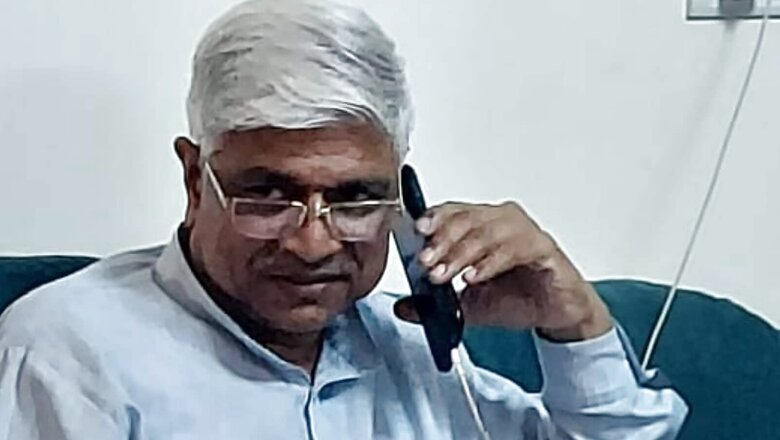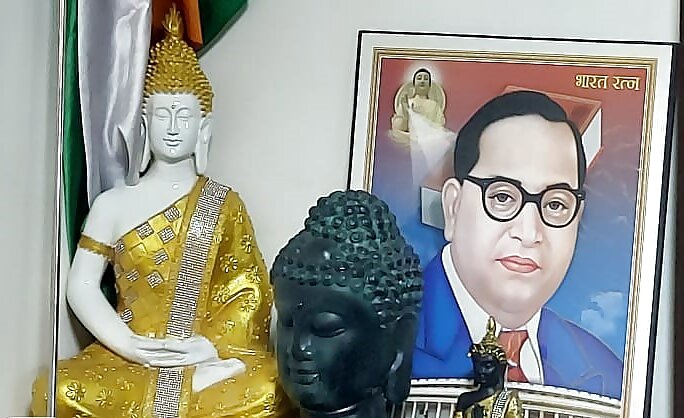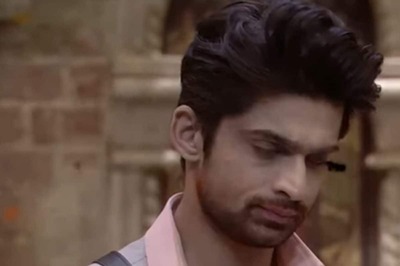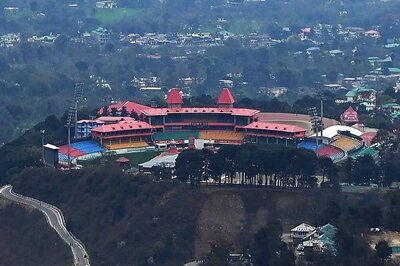
views
The morning after Delhi’s Aam Aadmi Party (AAP) minister Rajendra Pal Gautam submitted his resignation, his phone did not stop buzzing with congratulatory messages from across India and the world (this reporter was present for approximately two hours and was witness to it). A very relaxed Gautam in his Number 4, Civil Lines residence, greeted every caller with “Namo Buddhaya, Jai Bhim”, “sankalp liya hai, pure desh ko taiyar karenge, saare log bhavuk ho gaye hain, phone bahut jyada aa rahein hain (have taken a pledge, will ready the whole country, the people have become emotional, getting a lot of phone calls)” and also confirmed dates for his possible attendance in various social and political gatherings.
However, sources indicate that Gautam, who is caught in a huge row over his presence at a recent religious conversion event, has not received any message from AAP chief Arvind Kejriwal directly, or had any meeting with him or any other party leader. The only AAP leader in touch with him was deputy chief minister Manish Sisodia. Sisodia contacted him twice on Saturday, advising him to “lie low”, and on Sunday morning, when the deputy CM told him that the Bharatiya Janata Party (BJP) had made this a “mudda” (issue) in Gujarat, and the party was facing a lot of “dikkat” (difficulty).
“I sent my resignation at around 5 pm yesterday. I do not know whether it has been accepted or not,” said Gautam in between accepting calls. He is also extremely clear in his head that if the party becomes an obstruction to his work as an Ambedkarite, he would rather leave AAP than compromise on his life’s calling. “Mein kattar deshbhakt hun, kattar imandaar hun, Babasaheb Dr Ambedkar ka kattar sainik hun (I am a staunch patriot, staunchly honest, a loyal soldier of babasaheb Dr Ambedkar). I have been the national chief general secretary of Samata Sainik Dal, I cannot be distracted from the path of Dr Babasaheb Ambedkar at any cost, even it means paying for it with everything I have, even my life,” he told CNN-News18.
What if he has to leave the party because of his deeply held beliefs? “Party is a small thing, parties are built by people, party is not important. What is important is ‘apne samaj ka gaurav, swabhiman, izzat (my community’s glory, self-respect, dignity)’, this is important. There is no question of veering away from Ambedkar’s teachings, which would be akin to death, he said. “The day I feel that AAP is an obstruction to my Ambedkarite mission, I will leave politics and work completely for the upliftment of society,” he reiterated.
BJP MP Manoj Tewari’s tweet of a short clip of the “diksha” ceremony in which Gautam participated sparked a huge controversy with the saffron party gunning for both the erstwhile AAP minister as well as party convener and Delhi chief minister Arvind Kejriwal. On the same day, sources within the party indicated that the AAP boss was “very displeased” with what had transpired. Sources also indicated that Rajendra Pal Gautam should have exercised caution as he was not “just an MLA” but also a “minister”. With the spark threatening to become a fire that would combust the party’s aspirations in election-bound Gujarat, Gautam was gently nudged to put in his papers. Since the controversy erupted, there have been no meetings at all between Kejriwal, or any other top leader of AAP, with Gautam. The former minister himself confirms this. “No, I have been very busy with so many people visiting my house since two days before the diksha ceremony, I have had no time to go meet anyone,” he said.
Posters targeting AAP and Kejriwal for being “anti-Hindu” had surfaced in various parts of Gujarat. The video of the “22 vows” with Gautam had gone viral. Though Kejriwal’s displeasure over the sequence of events on Friday was a clear indicator of what was to come, it was the Sunday conversation with the Sisodia that perhaps hastened the process with the party hoping to contain the damage. Gautam sent his resignation to Arvind Kejriwal around 5 pm, just as the latter addressed a public meeting in Surat.
Gautam was born on April 26, 1968, in northeast Delhi’s Ghonda village. While his mother was from there, his father came to Delhi from Meerut, now Baghpat, Uttar Pradesh, in search of jobs. In fact, Gautam recalls that his father worked as a labourer in the same school in Ghonda from where he cleared class 12th before getting a job as a “notice server” in the Income Tax department. Gautam completed his graduation from Ramjas College, Delhi University, before studying law at the Campus Law Centre. He went on to specialise in labour law from the Indian Law Institute and also holds a post-graduate diploma in Human Resource Management from IGNOU. His wife Sushila has studied at Miranda House and works as a “special educator” with the Delhi government for the hearing and speech impaired.
Gautam’s entry into politics and AAP was unplanned and sudden. “I am an Ambedkaraite and ‘rajneeti raas nahi aati (politics doesn’t quite suit me)’,” he said. AAP was looking for candidates for the 2014 assembly elections, and saw merit in Rajendra Pal Gautam who by then was staying in Seemapuri. The party gave him a ticket to contest from the area on December 25, 2014, a month after taking his biodata. Gautam won his first election by a margin of nearly 49,000 votes. In 2020, he was fielded from the same seat and won by more than 56,000 votes in spite of a full-day campaign by home minister Amit Shah for the BJP in the constituency.
Since 1993, till he became a minister in Kejriwal’s cabinet in 2017 after the resignation of Sandeep Kumar, Gautam has been a practising lawyer. Even before becoming an MLA, he was in charge of the legal cell of the party in Delhi and has been to court many times on various cases against AAP chief Arvind Kejriwal to defend him. However, once he became a minister, he had to surrender his licence as per rules, which now he plans on applying for again. “I will fight for justice for the people of my community, in my constituency, on the road, and also in the court of law. I will also fight for Brahmins,” he said.
His introduction to Buddhism and Ambedarite thought started early in Ghonda while he was still studying in class nine. “I heard the sermons of ‘Boudh Bhikshus’, came in contact with Ambedkarites, was active in the Dr Ambedkar Jagriti Sangh, and started tutoring kids for free after joining Ramjas College with other young people. 22 families had given us rooms for this. I did this for six years, and kids taught by us started topping their classes. It was very successful. Private tutors had to shut their shops,” Gautam recalled with pride.
Dr Ambedkar founded the Samata Sainik Dal in Nagpur on September 24, 1924, a year before the RSS was founded in Nagpur, where Rajendra Pal Gautam worked in various roles for more than 30 years of his life, quitting only when he entered politics. He joined the Dal in 1987 as a volunteer before rising to become the national treasurer in 1997 and going on to become the national spokesperson and then national chief general secretary in 2002, a post on which he continued for six years.
Gautam’s official residence at Civil Lines is replete with images and statues of Lord Buddha, an enlarged photo of Dr Ambedkar, a photo of BSP founder Kanshi Ram, and a painting of Buddhist monks wearing saffron robes walking on the road. He says that though he has been a “practising” Buddhist for long, he will soon make it official. Two halves of the gate that leads to the hall for public consultations have two sets of pictures: one is that of Gautam with Arvind Kejriwal and AAP, and the other is that of him with Ambedkar and BSP founder Kanshi Ram, perhaps indicating the pull of each in the 54-year-old’s life. Early morning, Gautam’s partner in the law firm that he had founded, Harish Kumar Mehra, was one of the first visitors. Mehra, also a lawyer, converted to Buddhism on October 5 in Delhi, at the same function for which Gautam was targeted by the BJP and ultimately had to put in his papers.

The AAP leader stressed that no one forced him to resign. However, he is hurt that people from his community are being killed merely for keeping a moustache, entering a temple, touching a water pot, touching an idol, etc. “When an IPS officer receives a threat for taking out a baraat on a horse to marry an IFS officer, what will happen to ordinary people? I am hurt by the silence of the country’s prime minister, home minister and other political leaders on daily atrocities against Dalits,” he said.
Asked why he resigned if he believed he had done no wrong, Gautam said, “On October 14, 1956, Babasaheb Ambedkar took dishka and became a Buddhist with lakhs of followers along with these 22 vows. Since then thousands and crores of people participate in this programme on Ashoka Vijayadashami and take these vows, and there has been no controversy on this either by the media, or any party or government. In fact, the central government has published these vows in volume 17 of Dr Ambedkar’s writings and speeches. They have embossed these 22 vows on stone at Diksha Bhoomi. Their (BJP’s) chief minister and central ministers attend these. Yes, when I attended such a programme as an Ambekarite without the knowledge of my party or Kejriwal ji, and we do attend many programmes every day, it is not possible to keep the party informed about my every movement. However, the BJP in a poor display of politics tried to give it a different colour and tried to defame my party and Arvind Kejriwal. I was very hurt because of this.”
Gautam said that party chief Kejriwal had reposed faith in him by making him a minister twice, trusting him with key projects like the Jai Bhim Mukhyamantri Pratibha Vikas Yojana, a programme for cleaning sewers wherein karmacharis (workers) were made owners of the machines, provided assistance for studies abroad, and many more. He underlines that had Arvind Kejriwal not supported him, he would not have been able to do any of these. “I felt there was no point in continuing as a minister. I have to enhance the ‘maan, samman’ (honour and respect) of my party and my leader and I have to take this fight for justice across the country,” he said.
But, in retrospect, does Gautam believe that it would have been safer had he informed the party before participating in the diksha ceremony? “Programmes happen every day. Kejriwal ji is travelling continuously, he is very busy, and working very hard. We have to take his permission when a decision has to be taken on any policy matter, or when we have to travel out of Delhi, but not when we attend programmes in Delhi in the capacity of being a minister or even a social worker,” he said.
The AAP man in the eye of the storm has a word for the BJP. “They are adding ghee to the fire. They will burn their own hands. They don’t understand the strength of the Bahujan Samaj. They are just a handful of people, time will show them the strength of Bahujan Samaj, he said, adding, “I am thankful to the BJP for popularising the 22 vows in front of the entire world. I have been struggling since childhood with the fact that we are not accepted as Hindus, we are called untouchables, shudras, adivasis, we face atrocities daily and this manmade caste system has to end, yet no one was paying any attention to this…So, I felt very good when I heard RSS chief Mohan Bhagwat say, for the first time, that the caste system must end (varna vyavastha, jaati vaad khatam hona chahiye). However, this must not be mere lip service, it must be ended, or else crores of people will rise against this. You will not be able to stop this.”
Read all the Latest Politics News and Breaking News here



















Comments
0 comment